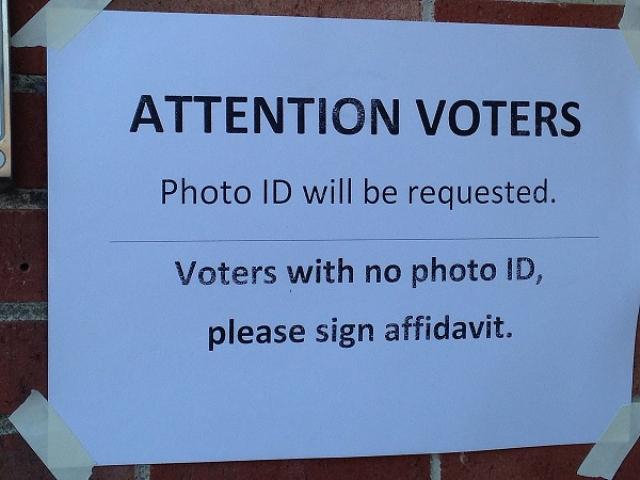Virginia has both the Constitution and common sense on her side
Remember when we all had to prove our citizenship to renew our driver's licenses a few years back? This was a result of the federal Real ID Act of 2005. It basically provides that a state must verify that one is a U.S. citizen or is here legally before issuing a license. If a license is issued as compliant with the Real ID Act, there is a star in the upper right corner of the driver’s license (“DL”), and the DL can be used as a “federal ID” to board a commercial aircraft, for example.
There would be two DL databases, one for citizens and another for non-citizens. A non-citizen must prove the duration of their authorized presence here. If it is a one-year visa, then their license would expire when their visa expires. Since non-citizens may not vote in federal elections, common sense tells us that anyone on the non-citizen list should not be on a voter roll. Simply compare the two and strike anyone from the roll whose name is in the non-citizen database.
We can expect howls from the Left, which wants and needs non-citizens to vote illegally. They may cry that some people in those non-citizen DL databases may have gotten their citizenship at a later time. Fine. Compare the non-citizen database against the citizen database. If someone has since gotten their citizenship, they should have gotten a new license, and they would not be stricken. These database comparisons should take only a few seconds once programmed, and there is no reason not to run them right up until election day.
Regarding Virginia and the DoJ’s suit against it to prevent the state from removing non-citizens from their voting rolls, there would seem to be some compelling legal arguments against such effort, not to mention a truckload of common sense. Virginia follows the Real ID Act. Virginia also seems to provide for non-citizens to get a Driver Privilege Card, even if they cannot prove any legal presence in the U.S. Certainly, anyone in that database should be removed from voter rolls, as their voting would be a clear crime.
The current DoJ case against Virginia, and perhaps others, seems to rely on the National Voter Registration Act, which they contend prohibits voter rolls from being purged within 90 days of an election. This contention defies common sense, because ineligible voters could simply not register until 89 days before an election.
Further, there may well be a constitutional problem with the DoJ’s interpretation of the NVRA. Generally speaking, a law can be unconstitutional in two ways. It can be unconstitutional on its face, in which case the entire law must be held unconstitutional. The second possibility is that a law is unconstitutional in its particular application. While the former may well apply as it disregards a general constitutional prohibition on non-citizens voting, the as-applied challenge is obvious. As stated above, the law effectively attempts to open a window of time when the Constitution’s requirement of citizenship to vote can and would be ignored, both legally and logically. By analogy, would we allow police to force an otherwise illegal confession so long as it is within a time window provided by a mere statute?
Our Constitution is not subject to the whims of Congress in avoiding it, no matter how well-intentioned their motive. Actually, a similar argument might and should apply to the Motor Voter Laws and any other law that permits or encourages the registration of non-citizens.
One might argue, in Virginia or elsewhere, that anyone who interfered with preventing a potential crime such as illegal voting might themselves be guilty of various offenses, such as voting interference, suborning a crime, an accessory before the fact, conspiracy, etc. Any law that compels such illegal behavior of clerks and other officials surely must fall.
It is past time for those who fight to register non-citizens to vote and/or fight to prevent their removal from the voting rolls to justify their actions. Such justification must be on a legal basis, not an emotional basis or simply needing more dependent voters. To my knowledge, no such justification has been proposed.

Image: MarkBuckawicki
Ad Free / Commenting Login
FOLLOW US ON
Recent Articles
- How the Fate of the West is Tied to the Fate of the Jewish Nation
- Green Cards, Student Visas and Domestic Terrorists
- Maybe the Little Things and Little People Matter
- The FBI Must Investigate Itself And, Once Cleaned, Several Other Political Crimes
- The Danger of Going Hungry
- The Tariff Is a Weapon
- Trump-O-Phobia Drives Some Americans to Questionable Greener Pastures Overseas
- A Businessman and a Brilliant Strategist
- A Remarkable Headline for a Fascinating Story
- Democrats Unmask Themselves
Blog Posts
- Hills to Die On: Democrats know how to pick 'em
- Near-death experiences, reliance on oil, and more cataclysmic failures—it’s all just part and parcel of ‘green’ energy
- So where'd America's obesity epidemic come from? Chef Andrew Gruel has a theory ...
- Trump just fired a huge warning shot over Iran’s bow
- Markets respond: Trumpian peace in Russo-Ukrainian war is in the bag
- The time of the hoax
- New York Times goes bipolar on Trump’s border control success
- Mark Kelly decides to offload his Tesla to protest Elon Musk
- The half-million dollar American
- Three things for the U.S. to understand about the Middle East
- Speaker Mike Johnson reveals why the Autopen scandal is a big deal
- The CDC website really needs to update its COVID protocols
- Hands in your back pocket
- Birthright citizenship: The facts
- ‘She’s my little Musk coupe’






